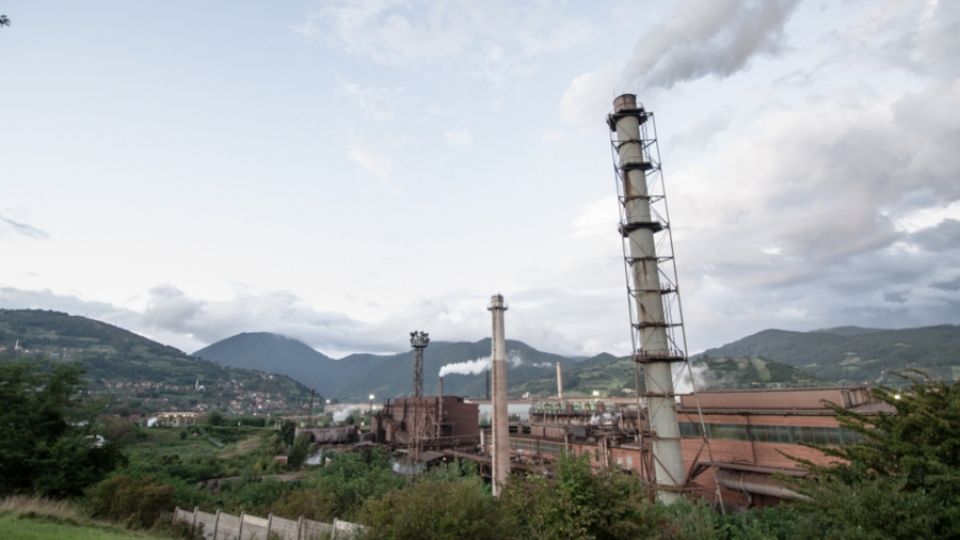The air in Bosnia and Herzegovina belongs among the dirtiest in Europe (1), and in 2020, it was ranked tenth for PM2.5 pollution worldwide (2). Despite that, citizens still have a hard time trying to understand who is responsible. Although the state authorities have been obliged to collect and publish the data on pollution since 2003, they have not been able to launch an adequate system so far. The non-governmental organizations Arnika (Czechia) and Eko forum Zenica (Bosnia and Herzegovina) published the top ten largest polluters for 2018 (3) based on the available data. They urge the governments to ensure access to information from all large industries.
The top ten largest polluters of Bosnia and Herzegovina can be found at https://eko.ba/baza-zagadivaca
Not surprisingly, large factories that are usually considered the culprits of pollution lead the top tens for 2018: ArcelorMittal Zenica, the Tuzla, Ugljevik, and Gacko thermal power plants, the Lukavac and Kakanj cement kilns, the GIKIL coke plant, and the refinery in Slavonski Brod. Arnika and Eko forum Zenica has been publishing the data collected from the state authorities since 2011. For the first time, the alternative database shows industries from both entities of the country.
“There was a slight improvement in the data transparency by 2019, as the annual emission reports are finally publicly available online (4). However, the official websites are not user-friendly and only experts can understand what the numbers represent. That is why we interpret the data and believe that the public will use it to act against the polluters and the authorities. Without public demand, the environmental conditions will never improve,” Samir Lemeš from Eko forum Zenica explains.
A comparison of the data from the last decade enables us to recognize which companies invest in modernization and technologies to protect the environment and human health. A decrease in the pollution from the Ugljevik coal power plant was caused by investment in desulphurization in 2019. The emissions of ArcelorMittal Zenica also decreased, but it was caused by the drop in production related to the global economic crisis; the citizens of Zenica are still waiting for modernization.
Some of the largest polluters are still hiding their environmental footprint – such as the coal power plant in Kakanj. While in the EU, coal power plants report emissions of about 15 pollutants, Bosnian plants – such as the Gacko coal power plant – publish data only on three to five basic chemicals. For example, information on releases of heavy metals, which represent serious threats to human health, is missing entirely.
The analysis of Arnika and Eko forum Zenica shows that the data submitted by the Industrial companies are not reliable and contains a huge amount of errors; almost 90% of the data is irrelevant. Moreover, the entities of Bosnia and Herzegovina operate different systems using different methodologies.
“Although Bosnia and Herzegovina signed the PRTR Protocol (5) in 2003, the parliaments did not ratify it till today. Thus, the system is not obligatory for industries. Transparency of data on pollution is a key step on the way to cleaner air. Without access to information, the state authorities cannot act. The public and the media are not able to control the situation, and the polluters can continue with business as usual at the expense of the environment and public health,” Martin Skalsky, an expert on public participation from Arnika, says.
For comparison, in Czechia, 1,334 facilities reported emissions in 2018 and the reports included 35 pollutants in the air and others in soil, wastewater, and waste, while in the Federation of Bosnia and Herzegovina it was only 19 air-polluting substances (6) and in the Republika Srpska only six chemicals. The situation is not improving and the number of substances reported is basically the same today as it was back in 2011.
Notes for editors:
(1) On the pollution of Bosnia-Herzegovina's cities as the most polluted in Europe: https://www.iqair.com/world-most-polluted-cities?continent=59af92ac3e70001c1bd78e52&country=&state=&page=1&perPage=300&cities=; https://www.iqair.com/bosnia-herzegovina
(2) IQ Air – World's most polluted countries 2020 (PM2.5): https://www.iqair.com/world-most-polluted-countries
(3) 2018 is the year for which the latest data is available in the responsible ministries of FBiH and RS.
(4) Two authorities are responsible for the data collection, as the country of Bosnia and Herzegovina was divided by the Dayton Peace Agreement in 1995 into two entities: the Republika Srpska and a Federation of Bosnia and Herzegovina, and in 1999 a self-governing administrative unit, the Brčko District, was formed.
Register for Federation of Bosnia and Herzegovina (Federal Ministry for the Environment and Tourism): https://www.fmoit.gov.ba/bs/okolisne-dozvole/registri-i-izvjesivanje
Register for the Republic of Srpska (Hydrometeorological Institute of Republika Srpska): https://rhmzrs.com/zivotna-sredina/inventari-emisija-u-vazduhu/inventar-zagadjujucih-materija/
(5) A mandatory information tool for the signatories of the Protocol on Pollutant Release and Transfer Registers to the UNECE Aarhus Convention on environmental democracy, signed by Bosnia and Herzegovina back in 2003. However, the country has still not ratified the PRTR Protocol till nowadays.
(6) Arsenic, cadmium, copper, mercury, nickel, lead, zinc, ammonia, methane, HCL, HF, PAH, PCDD/F, NMVOC, CO, CO2, SO2/SOx, NO2/NOx, PM10.







